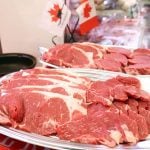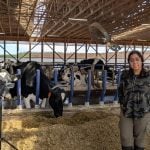The European Union and Canada agreed in principle on a multi-billion-dollar trade pact Friday that will integrate two of the world’s largest economies and paves the way for Europe to clinch an even bigger deal with the United States.
Canadian Prime Minister Stephen Harper and European Commission President Jose Manuel Barroso sealed the pact — the EU’s first with a member of the Group of Eight biggest world economies — by resolving outstanding issues in Brussels.
Launched in May 2009, the talks had been stalled for months over quotas for Canadian beef and EU cheese. In a cheeky touch, chefs served gorgonzola and feta at the four-course lunch laid on for the two leaders.
Read Also

U.S. grains: Soy hits four-month high on hopes for China trade deal
U.S. soybean futures jumped to their highest level in more than four months on Monday on hopes that China will resume buying American supplies after President Donald Trump said the countries were set to reach a trade deal during his trip to Asia this week.
“This agreement is a landmark achievement for the transatlantic market,” Barroso told a news conference, flanked by Harper. “With political will and a good dose of hard work, there is a way to reach a result that benefits people on both sides of the Atlantic,” he said.
The deal marks a breakthrough for Brussels’ free-trade agenda, which had previously achieved smaller agreements with South Korea and Singapore. It is expected to increase bilateral trade in goods and services by a fifth to 25.7 billion euros (US$35 billion) a year, according to the latest EU estimates.
Barroso said he hoped the agreement could come into effect from 2015, after EU governments, the European Parliament and the Canadian provinces give their blessing.
The deal will also make Canada the only G8 country — and one of the only developed nations anywhere — to have preferential access to the world’s two largest markets, the EU and the United States, home to a total of around 800 million people.
“This is the biggest deal our country has ever made,” Harper said, adding that it outstripped the North American Free Trade Agreement between Canada, the United States and Mexico.
Tough hurdles
The Commission is negotiating trade pacts with more than 80 countries on behalf of the bloc’s 28 members, following the collapse of the marathon Doha round of global trade talks. The delays that dogged the Canada agreement showed how difficult such deals can be.
European efforts to sign a free-trade accord with the United States faced a setback this month when a second round of negotiations was cancelled because of the U.S. government shutdown.
Despite plans to do a deal by the end of next year, the talks have also been overshadowed by reports the U.S. bugged EU offices under surveillance programmes made public by fugitive former intelligence contractor Edward Snowden.
Still, the Canada agreement should provide a boost for EU trade chief Karel De Gucht and could serve as a template for U.S. talks. Both deals seek to go far beyond tariff cuts and to reduce transatlantic barriers to business. There are also similar sticking points, such as agriculture.
“It’s a good signal. I’m a transatlanticist,” German Economy Minister Philipp Roessler told Reuters at a trade ministers’ meeting in Luxembourg. “It’s a great basis for all other negotiations, such as the TTIP talks with the United States,” he said, referring to the proposed deal by its formal name, the Transatlantic Trade and Investment Partnership.
The EU-Canada pact would eliminate tariffs on almost all goods and services, set larger quotas for EU dairy exports and make it easier for EU carmakers to export vehicles to Canada.
“Sold out”
The EU will eliminate duties on a range of Canadian agricultural products, from wheat to maple syrup. Canada will be able to export 80,000 tonnes of pork and 50,000 tonnes of beef free of duties to the European Union.
“The elimination of EU tariffs in the agricultural sector and the fish and seafood sector will mean that lobster fishermen in the Maritimes, maple syrup producers in Quebec, apple growers in Ontario, grain producers in the Prairies, cherry growers in British Columbia and arctic char farmers in the Yukon who export to the EU will see their bottom lines improve,” Harper’s office said in a release Friday morning.
For the pork sector, an EU pact is expected to provide returns “far greater than the projected export value when factoring in the additional economic development stimulated by the increased feed grain production, meat processing and distribution activities generated by these new sales of Canadian pork,” Canadian Pork Council chairman Jean-Guy Vincent said in a separate release.
“Based on existing market intelligence and the anticipated market opportunities for specific cuts of pork, this deal could, in a few short years, lead to annual sales of C$400 million,” he said.
Trevor Atchison, president of Manitoba Beef Producers, said Friday the EU deal is estimated to offer over $600 million in potential benefit to Canada’s beef sector, including tariff-free access for 64,950 tonnes of fresh and frozen beef across three new categories, as well as tariff-free entry for live cattle, genetics and byproducts such as offal, tallow and hides.
Canada’s canola industry, meanwhile, estimates ending tariffs through the EU pact could allow exports of canola oil to Europe to run up to $180 million a year. The EU “has an ambitious biofuels agenda and canola oil is the preferred feedstock for biodiesel production,” the Canola Council of Canada said Thursday.
Under the EU/Canada agreement, for the first time, provincial governments in Canada are to commit to opening their lucrative procurement markets to allow European companies to compete for contracts alongside locals.
Canada’s National Farmers Union said Thursday that Harper has “sold Canadians out to be governed by foreign corporations” and urged the government to open the deal’s final text to the public before votes are held to ratify the deal.
“The devil is always in the detail, which this government has never disclosed,” NFU president Terry Boehm said, adding local food systems “will be severely restricted. Harper’s negotiating tactic allowing increased importation of European cheeses will have negative effects on dairy farmers.
“As well, the increase in beef exports to the EU is a red herring — we have not filled existing export quotas for hormone-free beef to this point.”
“If this deal proceeds, the Canadian government will have given the EU an additional exclusive access of 32 per cent of the current fine cheese market in Canada, over and above the existing generous access,” Dairy Farmers of Canada said Wednesday.
The trade deal, DFC said, will “displace our local products with subsidized cheeses” from the EU, which already uses two-thirds of Canada’s tariff rate quota (TRQ) for tariff-free imports of 20,412 tonnes of cheese.
Quebec’s Union des producteurs agricoles on Thursday described the decision to expand market access for “dumping” of EU cheeses as “regrettable,” and argued Canada had made sufficient concessions in other economic sectors in this deal to justify the level of access granted to Canadian beef and pork.
— Robin Emmott and Philip Blenkinsop are senior correspondents for Reuters, based in Brussels. Includes files from AGCanada.com Network staff.












